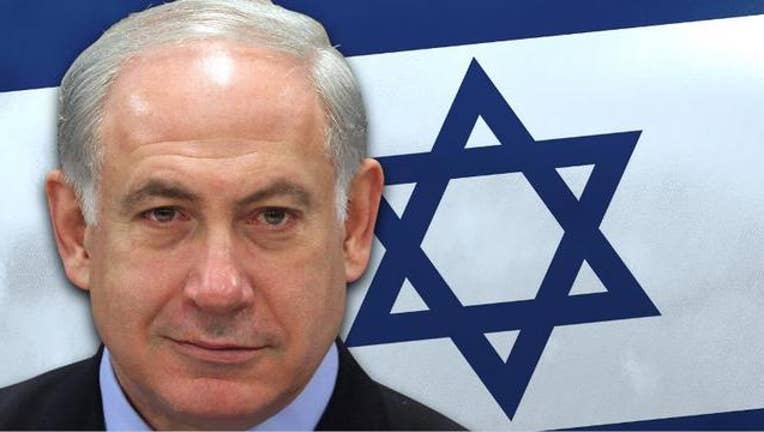Israel's Netanyahu heads to Berlin to meet Kerry

JERUSALEM (AP) — With no end in sight to weeks of Israeli-Palestinian violence, Israel's prime minister headed to Germany on Wednesday for a high-profile meeting with U.S. Secretary of State John Kerry aimed at restoring calm.
As Benjamin Netanyahu departed for Berlin, a Palestinian stabbed a female soldier near Jerusalem, critically wounding her, police said, before he was shot and killed by security forces. Earlier, Israeli troops shot a teenage Palestinian girl in the West Bank after she allegedly approached a settlement with a knife.
Relatives identified the girl as Estabraq Nour, 14, from a nearby village. They said she sneaked out of the home early in the morning through a window and disappeared. The girl was taken to an Israeli hospital, and details on her condition were not immediately known.
A relative said she had been influenced by videos showing previous stabbing attacks circulated on social media sites. The relative spoke on condition of anonymity, for fear of upsetting other family members.
Wednesday's violence was the latest in a series of almost daily Palestinian attacks against Israeli civilians and soldiers that erupted about a month ago. Many of the attackers have been youths in their 20s or teens, and in some cases, they appear to have been influenced by graphic videos spread on social media.
During that time, 10 Israelis have been killed by Palestinian assailants, mostly in knife attacks, while 47 Palestinians — including 26 labeled by Israel as attackers — have been killed by Israeli fire. The remainder died in clashes between Israeli forces and Palestinian protesters. An Eritrean migrant was killed after being mistaken for an Arab attacker.
The Kerry meeting highlights several days of intense diplomatic efforts to end the violence. U.N. Secretary-General Ban Ki Moon has rushed to the region to urge calm, meeting Netanyahu on Tuesday and Palestinian President Mahmoud Abbas on Wednesday.
Kerry meets the Israeli leader on Thursday in Germany, before heading to the region for talks with Abbas and Jordanian King Abdullah II this weekend.
Before departing, Netanyahu said he hoped his meeting with Kerry would focus on "ways to calm the situation." He said he would ask Kerry to press Abbas to halt what he says is Palestinian incitement fueling the violence.
On the second day of his trip, Ban met Abbas in the West Bank, where he called on both sides to end the bloodshed and to "tell their people correctly that there should be no killings." The U.N. chief was set to hold a special briefing for the Security Council.
"I understand the frustration that comes after years of dashed hopes. But the only way to end the violence is through real and visible progress toward a political solution, including an end to the occupation and the establishment of a Palestinian state living in peace and security with Israel and its other neighbors," Ban said.
Abbas said that he was seeking a resumption of peace negotiations based on international resolutions calling for a full Israeli withdrawal from the West Bank and east Jerusalem — terms that Netanyahu rejects.
The comments by the Israeli and Palestinian leaders reflected the wide gulf between them as the violence continues.
The unrest erupted last month with clashes between Palestinian protesters and Israeli forces at a Jerusalem holy site revered by Jews and Muslims.
The site is known to Jews as the Temple Mount, the holiest site in Judaism and home to the biblical Temples. For Muslims, it is the Noble Sanctuary, home to the Al-Aqsa Mosque, the third-holiest site in Islam and a key national symbol for the Palestinians. The site, captured by Israel from Jordan in the 1967 Mideast war, is a frequent flashpoint of violence.
The Palestinians accuse Israel of trying to change the longstanding "status quo" at the site, which allows Jews to visit but not to pray. They point to a growing number of Jewish visitors who seek an expanded Jewish presence and prayer rights at the site.
Netanyahu says there are no plans to change the status quo, and the Palestinian allegations are slanderous incitement. He says the hostile rhetoric, and incendiary videos making the rounds on social media, are fueling the violence.
The Palestinians say the violence is the result of living under Israeli occupation for nearly 50 years. Following the collapse of U.S.-mediated peace talks last year, they see little hope for realizing their dream of gaining independence and establishing an independent state.
Netanyahu says Palestinian hostility goes back decades, long before Israel captured the West Bank, east Jerusalem and the Gaza Strip in 1967.
Speaking to a group of Jewish leaders Tuesday, Netanyahu tried to use a historical anecdote to illustrate his claim that Palestinian incitement surrounding Jerusalem's most sensitive holy site goes back decades.
He mentioned how the mufti of Jerusalem during World War II, noted Nazi sympathizer Haj Amin al-Husseini, also instigated attacks on Jews over claims that they planned to destroy the sensitive Jerusalem site. Then he suggested that during a 1941 meeting in Berlin, al-Husseini convinced Hitler to destroy the Jews.
"Hitler didn't want to exterminate the Jews at the time, he wanted to expel the Jews," Netanyahu recalled. "And Haj Amin al-Husseini went to Hitler and said, 'If you expel them, they'll all come here.' 'So what should I do with them?' he asked. He said, 'Burn them.'"
The comment sparked uproar in Israel. Holocaust experts and survivors slammed Netanyahu's comments as historically inaccurate and serving the interests of Holocaust deniers by lessening the responsibility of Adolf Hitler and the Nazis.

